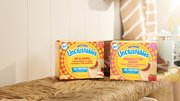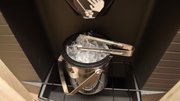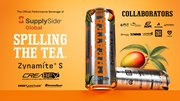Blog
New Single-Cup OCS Options Offer Private-Label Opportunity
July 5, 2015 | Kevin Daw
TAGS: Vending Times columnist, vending, office coffee service, OCS editorial, coffee industry, coffee market, coffee roasting, Heritage Coffee, Kevin Daw, private label coffee, private label coffee vs. national brand coffee |
I am writing this having just returned from the National Automatic Merchandising Association OneShow in Las Vegas. As always, it was a great, can't-miss show for those seeking an edge in the marketplace. All the usual suspects were present, and it was great to see so many old friends again. Regrettably, Butch Winkler of Holiday House Distributing, a strong industry advocate, contributor and friend, stayed home to deal with a family health issue, showing that he has a heart, as well as brains! Good wishes to the Winklers were abundant.
Also in abundance were K-Cups, and even more K-Cup knockoffs. So much celebrity branding in hopes of instant name recognition was startling. It made me think back to my dad's philosophy on being an office coffee operator. Stuart Daw was very pro private label, and famously debated big national brands twice, back in his day.
An operator who was 100% private label would forego some sales, and I've only known a couple of operators who have done that. Even so, my dad's arguments for an operation making the extra effort to be sure every possible cup sold is its own should be studied carefully. He knew both sides of the issue well, and I present his list of pros and cons for your consideration.
Pros Of National Brand Labels
1. Almost everyone recognizes national brands and celebrities. Millions of dollars are spent advertising to build these names, so the client can recognize them on sight.
2. There are many labels from which to choose.
3. A buyer interviewing a private-label and a national-brand salesperson will likely have more confidence in the national brand, even if all other aspects of the presentation are the same.
4. National brands generally offer consistent quality control.
5. National brands help promote sales with and for you.
6. National brands are generally in constant supply, available with short lead-times from local wholesalers.
Pros Of Private Label Sales
1. You have control over your pivotal product, and, therefore, your business.
2. You have the ability to specify the quality level that suits your goals.
3. The money you save by not buying branded product can be used as you like, including quality upgrades.
4. There is no competition for your brand. No one else can trade on your name legally, so promotion is yours exclusively.
5. With your exclusive brand you can, if you wish, enter the entire away-from-home market for coffee supply, selling to restaurants, the hospital and healthcare field, hotels, catering trucks, stadiums -- indeed, every nook and cranny of the market. This potential volume is at least five times or more greater than coffee service itself.
6. You can create a mystique for your brand and its quality that enables you to attain a higher average selling price. Many operators mistakenly assume they must sell their private label for less than the national brands, simply to increase volume.
Cons of National Brand Sales
1. With practically every other operator in your market also selling nationally branded coffee, you confront an inevitable "auction" effect, with the business going to the highest bidder. Those who say "Ah, but we are selling service" must realize that "service" is too abstract an idea to sell in conversation with a buyer; the only reality is the actual coffee itself during your demonstration. Proof of your service comes only after you get the business.
2. The price upcharge levied by national branded companies is spent on promotion in which you may or may not want to be involved, and from which you can never be sure that you got your share of the booty. At X¢ per pound extra cost, you have to constantly determine whether you might be giving more than you are getting. As your business grows, you pay more and more in promotional upcharges built into your price. Thus, the "little guy" benefits at your expense.
3. As for maintaining an even quality level, the national brands are generally consistent, as are coffees from reputable private-label roasters. But the national brands need such quantities for their retail market that they tend not to buy ultra-high-grade coffees from small producing countries whose entire crop is insufficient to make a noticeable dent in their blend structure. Thus, it's difficult for them to seriously consider high quality per se; only beans that permit steady control of a cost-dictated blend structure make the cut.
4. It is true that the national brands are recognized in the retail market, where they spend their way to market share. But in all segments of the away-from-home market, buyers make value judgements different from a homemaker's. Those buyers look for the best possible coffee at the lowest possible price; comparisons, and thus careful buying decisions, can be made. The homemaker has less chance to compare.
Unfortunately for coffee services, offices are the one exception to that rule; the habits of the homebuyer all too often influence what happens at work.
5. The sales promotion conducted by the nationally branded coffee companies with funds collected by upcharging the coffee service operator is done in their own self-interest. They view the coffee service operator disdainfully as a conduit for their product that they have presold by national advertising; you just deliver it.
6. Their promotional activity generates a huge computerized list of customers -- our customers -- who would be their customers at the whim of a new vice-president with a budget and an evil idea.
7. Nationally branded companies use their lists of your customers to promote products you may not want to sell. For example, they have been known to introduce a new blend of coffee directly to the customers of coffee service operators. The operator may or may not wish to introduce a new brand into the product mix.
8. The foregoing brings up the question, "Whose customers are they anyway -- yours or the national roasters'?" If it is the coffee brand the customer is buying and not just your service, you may guess the answer, and the easy availability of the national brand at the retail store is dangerous to the whole coffee service industry.
9. In selling coffee at the restaurant and institutional level, you are in hopeless shape with the national brand, because the company that owns the brand is already selling it. Therefore you are missing out on a large segment of your industry.
10. The national-brand company may promote local coffee services by providing a list of their operators to prospective customers, but they may ignore those serving that marketplace from a nearby city.
And the names provided by the national brands may include wholesalers whose price structure in selling by the pound is extremely low. Indeed, wholesalers often buy national-brand coffee for less money than a coffee service operator would pay for equivalent poundage, enabling the wholesaler to sell in some cases to a large end-user at a price that is below the cost to the coffee service operator.
11. One of the wonderful things about coffee is that quality judgments are subjective. There is much mystique involved with good marketing by the imaginative entrepreneur. The only way to objectify coffee flavor is by slapping a label on the bag; that tells the coffee drinker what flavor is there.
Once you use the non-exclusive national-brand label you have objectified things for the customer, letting him take bids on an objectively measurable (through a common label) standard product. That puts you in the same class as the sugar or toilet tissue salesman.
Private Label Disadvantages
1. There is a time involvement in working with your private-label supplier in establishing the quality level at which you wish to operate. You have to learn something about differentiating coffee flavors and types. While it is not terribly difficult to acquire the skills needed, it does take some doing. The easy way out is to have the supplier pack one of his standard blends in your own graphics.
2. Because no one else is handling your product, it will have to be packed to order, requiring some lead time from the day of order to the day of delivery. This takes at least a bit more organizing and control of inventory than would be necessary in purchasing the national brand from a wholesaler.
3. Although the cost of your coffee will be substantially less when bought from a good private-label supplier, there will, of course, be little to no "help" in marketing the product. The selling of your own product is likely to be entirely in your own hands.
The Choice
To resolve the issue, you should begin by asking a question, the answer to which has enormous consequences to you: What business are you in? Are you in the coffee business for yourself, or are you a jobber? If you are in the coffee business, then you are in the same business as the roaster. You merely subcontract the roasting, grinding and packaging of your coffee to someone else who has put up all the capital and expertise needed to do the job. The nationally branded coffee is your competitor and enemy, not your supplier and friend. National brands often sell more coffee through retail stores than they do to coffee service operators. That is their proper goal: to sell as much poundage as possible by every possible means. But pursuing their own self-interest does not require them to pursue yours, too; pursuing your own interests is your job, not theirs.
If you decide you are in the coffee business, you must control that business in terms of quality, packaging, economics, graphics, distribution, and all other elements involved.
As always, may your cup be full, and the brew exquisite!
 KEVIN DAW is president of Heritage Coffee Co. (London, ON, Canada), a private-label roaster serving the breaktime management industries. A 30-year veteran of OCS, water delivery and vending operations, he has concentrated on coffee roasting for the past two decades.
KEVIN DAW is president of Heritage Coffee Co. (London, ON, Canada), a private-label roaster serving the breaktime management industries. A 30-year veteran of OCS, water delivery and vending operations, he has concentrated on coffee roasting for the past two decades.






